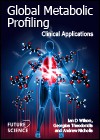abstract
In prenatal care there is a continuing need for improved methods and new biomarkers for the diagnosis of fetal and maternal disorders, specifically in relation to conditions usually diagnosed invasively (e.g., chromosomal disorders) and to later-developing conditions that put fetal and/or maternal health at risk (e.g., preterm delivery, preeclampsia [PE] and gestational diabetes mellitus [GDM]). The monitoring of the newborn’s health may additionally benefit from new methodologies, which should also shed light onto the role and impact of previous pregnancy characteristics on the newborn baby. In this chapter, the attempts made so far to find circulating metabolite biomarkers of prenatal and newborn disorders through blood metabolomics are reviewed. This methodology entails the comprehensive analysis of low-molecular-weight (Mw) molecules (metabolites) involved in intermediary metabolism and the detection of metabolite profile deviations, which may translate into disease biomarkers. With focus on 1H NMR spectroscopy and MS profiling techniques, in tandem with multivariate data analysis methods, blood metabolomics has, in the present context, mainly addressed maternal blood plasma or serum (collected during pregnancy or at delivery), along with some instances of umbilical cord (UC) blood (collected at delivery) and newborn blood analysis.
authors
Pinto J, Domingues MR, Gil AM



